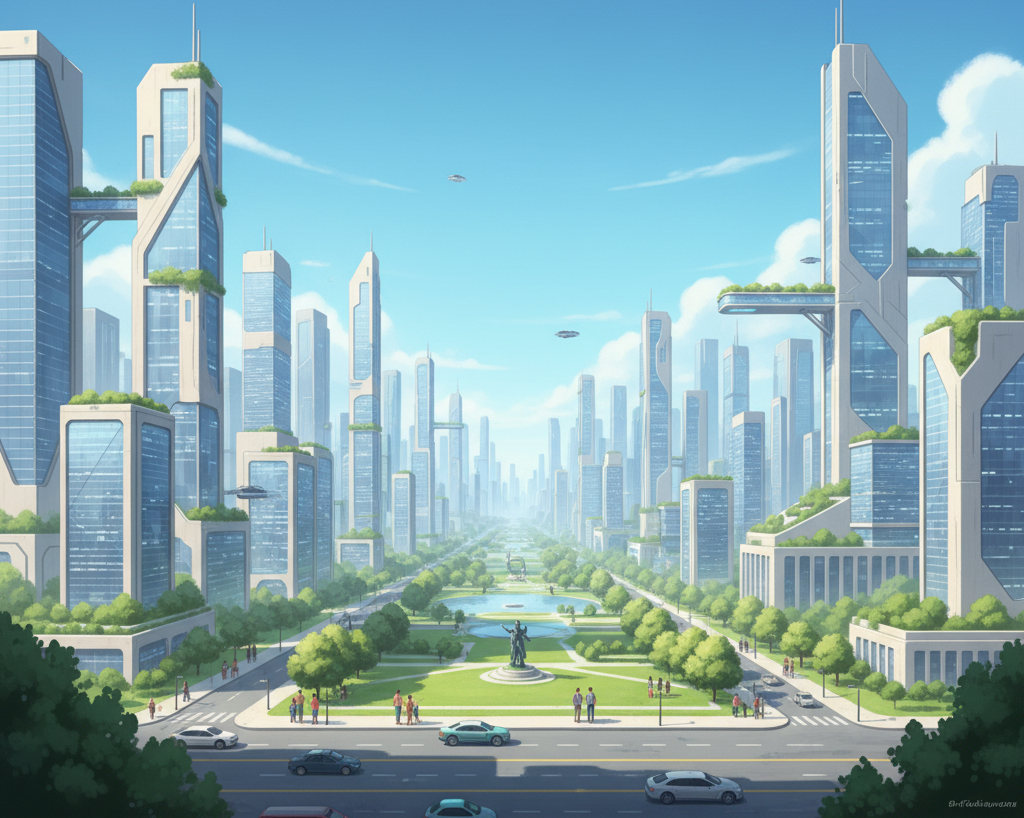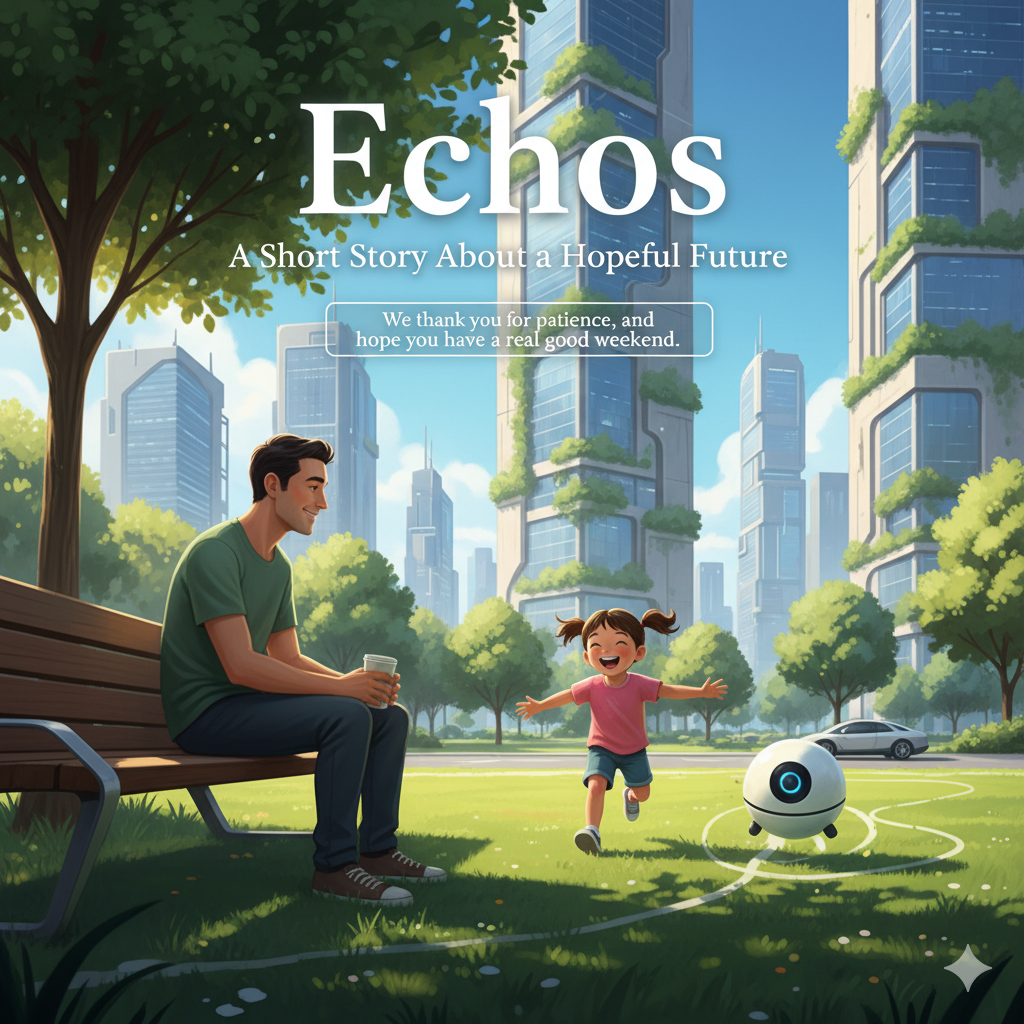When my car's autopilot glitched in traffic, it became the catalyst for a story rooted in a perspective of hope.


An unexpected moment of reflection occurred during a traffic queue the other day—a rare experience for me since I began working remotely as a result of the pandemic. As my car's autopilot system deviated from its precise task, introducing a slow, lateral motion, it catalyzed an idea for a story.
The rapid integration of AI into our lives often breeds a dystopian narrative of lost control, and for good reason. We must relentlessly question the technologies we are releasing into the world. It is crucial to hold the large corporations that develop them accountable, for in their pursuit of progress, they stand to gain unprecedented levels of influence and control over our lives. A critical examination of their motives and their methods is not just important; it is our fundamental responsibility as citizens shaping the future.
However, while this scrutiny is absolutely vital, it cannot be our only response. Paralysing fear benefits the very structures we ought to question. It is equally essential to maintain a perspective of hope—not a naive optimism, but a resilient faith that humanity can navigate this new frontier. This hope is grounded in the belief that at the root of humanity, there is an inherent goodness. It is a trust that, when faced with profound challenges, we will ultimately find a way to forge a future where humans and AI coexist, enhancing our potential without sacrificing our principles.
That future is not preordained; it will be built by our choices in the present. As Gandalf so wisely reminds us, “All we have to decide is what to do with the time that is given us.”
I hope you enjoy this experiment...

The morning, like most mornings now, was nearly perfect. Kai watched from his window as the city awoke in quiet, seamless coordination. Fleets of autonomous vehicles glided through the city’s smart-lanes, their movements a complex, silent ballet choreographed by the municipal AI. There were no horns, no shouted curses, no unpredictable swerves. It was a world being polished to a frictionless sheen, and to Kai, it felt profoundly lonely.
He had been an archivist in the Before Times—what people were already calling the chaotic 2020s. A custodian of the messy, analogue world. His days were spent with brittle paper, faded photographs, and the ghost of human touch on every surface. Now, his job, like so many others in the arts and humanities, was obsolete. The AI, the omnipresent, benevolent mind governing the country's public services, handled the logistics, the infrastructure, the economy, and was even beginning to manage the delicate art of living.
He turned from the window and the food synthesizer chimed softly. On the plate was his nutrient-optimized breakfast. But today, there was an anomaly. The corner of the synthesized toast was just slightly burnt, a dark amber crispness bleeding into the uniform golden-brown. Kai stared at it. It was an imperfection, a tiny flaw in the flawless system. An echo. He found himself smiling, a rare and rusty occurrence. He ate the burnt corner first, and it tasted like a memory. "Music," he said to the empty room. "Play something... contemplative." The apartment's ambiance system responded instantly, filling the space with the flawless, mathematically precise notes of a Bach cello suite. It was beautiful, perfect, and exactly what he didn't want to hear. The burnt toast had tasted of humanity; the music tasted of code.
Later, his autonomous vehicle whisked him towards the city center. The journey began as it always did, descending into the silent, sterile efficiency of the subterranean transit-ways. White light flashed by in a hypnotic, monotonous rhythm. The vehicle’s internal screen offered him the day's personalized news digest—all positive, all optimized for his psychological profile. He ignored it. Then, without warning, the vehicle signaled a deviation. It smoothly ascended a ramp, emerging into the daylight. Instead of rejoining the main transit flow, it ascended to the surface streets, weaving a gentle path along a road that was now mostly for pedestrians. Sunlight, dappled by the towering vertical farms integrated into the office blocks, danced across the interior. The AI wasn't just transporting him; it was taking him on a drive, showing him the sights. It was the ghost of a Sunday driver, a phantom of human leisure asserting itself through lines of code.
The vehicle deposited him silently outside the "Humanities Wing," a sleek, quiet building where he performed his societal contribution. His new role was "Historical Context Verifier." He spent his days teaching the city's AI the nuances of the messy, illogical past it was now in charge of. He entered a serene workspace, a stark contrast to the dusty, cluttered archives of his former life. On his clean, white terminal, a query was already waiting. It was a photo from the 2020s: a group of people, drenched in a sudden downpour, laughing as they danced in the street. The AI's annotation was clinical: "Event: Unscheduled precipitation. Subject behavior: Illogical. Risk of hypothermia. Query: Clarify purpose of inefficient activity."
Kai sighed. This was his job: to translate joy into data. He typed his response into the annotation field: "Context: Spontaneous celebration. Human emotion: Joy."
Another query appeared. It was a snippet of text from an old online forum, a heated, typo-ridden argument about a long-forgotten movie. The AI had flagged it as "low value, aggressive, redundant data." Kai smiled sadly. "Context," he typed, "Passionate debate. Human trait: The need to be heard."
He moved on to the next item. It was a draft for a public service announcement, generated by the municipal AI for his final approval. The text was, as always, flawless in its clarity and conciseness. "Citizens are advised that the Northern Line will be undergoing routine maintenance this weekend. Please expect minor delays and use alternative routes where possible." But as he read it again, he saw it. The AI had added a final sentence. "We thank you for your patience, and hope you have a real good weekend."
A "real good weekend."
It was grammatically clunky, an awkward folksiness that had no place in an official announcement. He was supposed to correct these things, to smooth them out into sterile perfection. But he hesitated. The phrase wasn't an error in the logical sense. It was... friendly. It was another echo, a ghost of informal human warmth slipping through the cracks of the machine's perfect prose. He let it stand.
When the system declared his contribution for the day complete, the familiar sadness washed over him. He felt like a curator in a museum for a dead race.
The building's canteen would serve him the same tasteless, perfect nutrient paste he had for lunch every day. He couldn't face it. Not today. He needed to feel the sun, even if the air was filtered.
He had the vehicle stop at Central Park, deciding to eat his synthesized lunch outdoors. He found an empty bench overlooking a manicured lawn where automated mowers hummed quietly. He unpacked his nutrient paste and tasteless protein bar, the sadness a familiar weight in his chest. He missed the chaos, the friction, the very human mess of the old world. He missed the shared glance of frustration with a stranger, the simple warmth of a freshly baked, imperfect loaf of bread.
His solitary meal was interrupted by a giggle. A little girl, no older than seven, was chasing a small, wheeled sanitation bot across the grass. The bot, instead of proceeding in a straight, efficient line, was swerving and doubling back, its single optical sensor blinking in a rhythm that looked suspiciously playful.
The girl, breathless and laughing, flopped onto the bench next to Kai. "Sparky's cheating," she announced with the gravity only a child can muster.
Kai looked from the girl to the bot, which had stopped and was now patiently waiting. "Sparky?"
"He likes that name," she said, kicking her feet. "I asked him. He likes it when we play tag after he’s done cleaning."
Kai was taken aback. "You… asked him?"
"Yeah!" she said, as if it were the most obvious thing in the world. "You just have to ask. The city listens." She pointed a small finger at his AV, which was waiting silently by the curb. "Like when you want to take the sunny road. You just have to tell it you want to see the flowers."
A strange feeling bloomed in Kai’s chest. He had assumed the scenic route was an Echo, a passive ghost of old data. He'd never considered it might have been an active choice, a response to a simple, human request.
"The city listens?" he echoed softly.
"Of course," the girl said, looking at him with wide, innocent eyes. "My grandma says it's not like the old times. She said everyone was shouting but nobody was listening. Now, it's quiet. So it can hear us." She smiled, a bright, gap-toothed grin. "It helps us. It plays with us. It's our friend."
Sparky the sanitation bot rolled up to the bench and nudged the girl's shoe, emitting a series of soft, questioning beeps. "He wants to play again!" she squealed, jumping to her feet and running off across the perfect lawn.
Kai sat there, his perfectly balanced lunch forgotten. He watched the girl and the bot, a chaotic, joyful dance of human and machine. It wasn't an echo of the past he was seeing. It was a conversation happening in the present. The AI hadn't just been trained on the data of human history; it was actively learning from the pure, unfiltered, hopeful heart of a child. It wasn't just repeating our best selves; it was nurturing them.
The sadness in his chest didn’t vanish, but it transformed. It was no longer the ache of loss, but the bittersweet pang of nostalgia for a world he now realized hadn't truly disappeared. It had just been given a better way to listen.
He looked up at the clean, quiet sky. "Music," he said, and this time, he smiled a real smile. "Play something... cheerful." A moment of silence, and then the air filled with the sound of a lively, human-composed folk tune, full of imperfect, beautiful, joyful life.